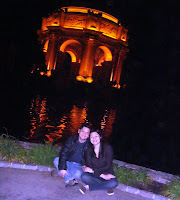Exploratorium of Fine Arts in San Francisco
 The task of creating a Palace of Fine Arts for the 1915 Panama-Pacific International Exposition fell to the architect Bernard R. Maybeck, then fifty years old and known for his innovative ideas. Setting to work on this new project, he chose as his theme a Roman ruin, mutilated and overgrown, in the mood of a Piranesi engraving. But this ruin was not to exist solely for itself to show "the mortality of grandeur and the vanity of human wishes .... " Although it was meant to give delight by its exterior beauty, its purpose was also to offer all visitors a stimulating experience within doors.
In playing host to the Panama-Pacific International Exposition, The Fair, which opened on February 20, 1915, San Francisco was honoring the discovery of the Pacific Ocean and the completion of the Panama Canal; it was also celebrating its own resurrection after the shattering earthquake and fire of 1906.
The task of creating a Palace of Fine Arts for the 1915 Panama-Pacific International Exposition fell to the architect Bernard R. Maybeck, then fifty years old and known for his innovative ideas. Setting to work on this new project, he chose as his theme a Roman ruin, mutilated and overgrown, in the mood of a Piranesi engraving. But this ruin was not to exist solely for itself to show "the mortality of grandeur and the vanity of human wishes .... " Although it was meant to give delight by its exterior beauty, its purpose was also to offer all visitors a stimulating experience within doors.
In playing host to the Panama-Pacific International Exposition, The Fair, which opened on February 20, 1915, San Francisco was honoring the discovery of the Pacific Ocean and the completion of the Panama Canal; it was also celebrating its own resurrection after the shattering earthquake and fire of 1906.
The problems of choosing the exact site in the city had finally been overcome and groundwork had been going on for some time. Last of the buildings to be erected, on the lagoon and close by a group of Monterey cypresses, was Maybeck's Palace of Fine Arts. With its exhibition hall to house the work of living artists (dominated by the Impressionists), its colonnade, and its rotunda -- plans for all of which had dazzled the Commissioners when the huge brown-paper sketch was put before them -- it fulfilled the architect's dream: it was as beautiful reflected in the water as it was against the sky. And when the Palace was completed (Roman in style although a freely-interpreted, purely romantic conception, and Greek in decorative treatment) its exceptional harmony gave it instant appeal to the public.






